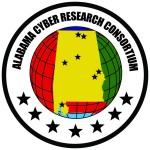Alabama Cyber Research Consortium Awarded National Science Foundation Grant
A newly organized consortium of the state’s top university cyber researchers has been awarded an NSF Science, Technology, and Society grant to develop a three-day conference at the National Science Foundation in Bethesda, Maryland in May. The conference will focus on ethics and digital forensics.
The Alabama Cyber Research Consortium (ALCRC) is a partnership of the seven PhD-granting universities in Alabama. Formed in 2013, after years of informal and formal collaborations between smaller groups of the partner Universities, the ALCRC is the culmination of individual and collective commitments to research, advanced development, education, and outreach in all areas of the cyber domain. Member institutions include: Alabama A&M University, Auburn University, Tuskegee University, The University of Alabama, the University of Alabama at Birmingham, the University of Alabama in Huntsville and the University of South Alabama.
“This award represents the first funding opportunity and significant national recognition for the ALCRC. It powerfully demonstrates the validity of the consortium and how closely tied together we are as members. It also speaks to the new ways in which higher education can organize to advance research in critical areas like cyber,” said Anthony Skjellum, COLSA cyber security and information assurance professor in the Department of Computer Science and Software Engineering, and director of the Auburn Cyber Research Center in the Samuel Ginn College of Engineering at Auburn University.
The ALCRC, along with The University of Alabama’s Cyber Institute and the University of Alabama at Birmingham’s Center for Information Assurance and Joint Forensics Research have received a significant grant from the NSF to design a national conference in the spring of 2015. The event will provide opportunities for members of the cyber community to address critical issues in digital forensics, including a lack of unifying ethical standards, procedures and guidelines for routine activities such as forensic analysis, cyber-crime case processing and data mining/surveillance.
“Auburn University is proud to be recognized as one of the founding members of the Alabama Cyber Research Consortium for our focus on and role in addressing topics of such vital importance to our state and nation. It reflects our commitment to the primary mission of serving the people of Alabama,” said Lieutenant General (retired) Ron Burgess, senior counsel for national security programs, cyber programs and military affairs at Auburn University.
“This is the first time that the topic of ethical guidelines for digital forensic examiners has been openly discussed at such a high level forum, “ said John Sloan, director of UAB’s Center for Information Assurance and Joint Forensics Research, and principal investigator of the grant. “We hope to develop policies and ‘best practices’ as a result of this conference that will assist forensic examiners and reduce potential lawsuits and mishandled criminal cases.”
In a statement issued earlier this month, Reginald Hyde, executive director of The University of Alabama’s Cyber Institute said, “This grant is the first of many anticipated funded projects between members of the Alabama Cyber Research Consortium. UA’s Institute is excited to begin developing cyber policy—such as that projected by this project—that benefits the citizens of Alabama.”
The Alabama Cyber Research Consortium is an active group of scientists, engineers, and affiliates committed to creating solutions with practical impact on the state, local, regional, and national economy, and to helping consumers, corporations, and the public sector solve real problems and avoid significant harm involving cybercrime and related national security issues.
To learn more about the Alabama Cyber Research Consortium, visit: www.ALCRC.org. To learn more about the Auburn University Cyber Initiative, visit: www.auburn.edu/cyber

Categories: Cyber
Back to Articles




